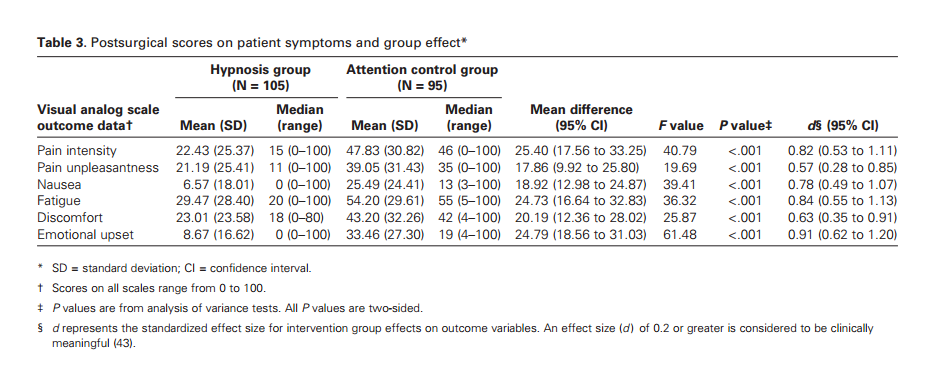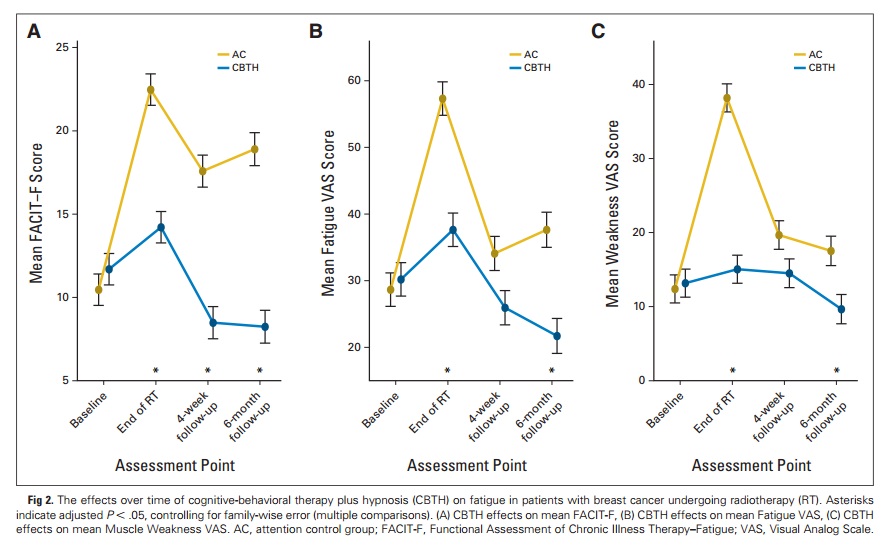1. Hypnosis to reduce pain and improve recovery in breast cancer surgical patients
- Hypnosis reduced postsurgical pain, nausea, fatigue, and emotional upset
- Hypnosis patients needed less propofol and lidocaine during surgery
- Hypnosis patients cost on average $772.71 less per patient than patients in the control group
2. Cognitive-behavioral therapy plus hypnosis (CBTH) to reduce fatigue in breast cancer patients undergoing radiotherapy
- CBTH reduced fatigue in patients during radiotherapy, and for up to six months following radiotherapy
3. Cancer treatment retraumatization in sexual abuse survivors
- Our group has developed the first ever Healthcare Triggering Questionnaire (HTQ) evaluating healthcare triggering experienced by adult sexual abuse survivors. The HTQ may be considered for use by researchers interested in studying healthcare triggering, healthcare retraumatization, and healthcare adherence. The HTQ may also be of use to clinicians interested in identifying trauma survivors who are more likely to experience triggering in healthcare settings.
- Through qualitative research, our group has demonstrated that for childhood sexual abuse survivors survivors, cancer and its treatment can trigger thoughts and emotions associated with the original abuse as well as negative evaluations of themselves, the world, and their future. We identified two primary themes describing CSA survivors’ experiences: Theme 1: treatment-related triggers (key subthemes: procedure-related, provider-related, and emotional triggers); and Theme 2: questioning the meaning of cumulative trauma (e.g., “Why me again?”).
4. 4. Training cancer care providers in an evidence-based, cognitive-behavioral therapy plus hypnosis (CBTH) intervention to help manage cancer related fatigue
- Our group has received National Cancer Institute funding to develop and test CBTH4fatigue, a blended learning program (E-Learning + Live Workshop) to train cancer care providers in CBT (Rational-Emotive Behavior Therapy) and Hypnosis to help patients manage cancer-related fatigue.
- For more information, or to apply, please visit http://cbth4fatigue.com/
5. Hypnosis to reduce musculoskeletal pain and improve medication adherence in breast cancer survivors prescribed aromatase inhibitors
- In this randomized clinical trial of breast cancer survivors, we seek to explore the efficacy of hypnosis in: 1) reducing the musculoskeletal pain associated with aromatase inhibitors; and, 2) increasing adherence to aromatase inhibitors. We will also explore whether hypnosis in this context is cost-effective. This R01 trial is funded by the National Center for Complementary and Integrative health
- For more information, please see https://clinicaltrials.gov/ct2/show/NCT02657993



